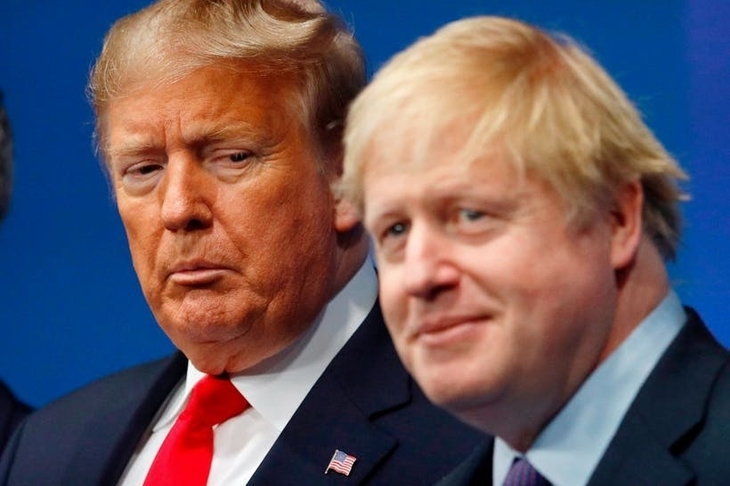Two weeks ago, I asked what kind of prime minister Boris Johnson might be and whether he could be ‘the great disruptor’ on foreign policy, defying standard practices and elite assumptions as Donald Trump has. I think I might have my answer. On Trump’s decision to take out Iranian terrorist-in-chief Qasem Soleimani, the Prime Minister was silent for two days. When he finally spoke, it was hardly worth it.
Of course Johnson was right to say, given the Quds Force head’s role in the killing of thousands of civilians, ‘we will not lament his death’. He was right too to warn Tehran against escalation. But in stopping there and failing to explicitly endorse Washington’s right to neutralise Soleimani, the Prime Minister erred against our closest ally and its pursuit of its global security interests.
Dominic Raab made a better fist of it on The Andrew Marr Show, saying:
‘It was General Soleimani’s job description to engage proxies, militias across not just Iraq but the whole region, not just to destabilise those countries but to attack Western countries… In those circumstances the right of self-defence clearly applies.’
That a foreign secretary would be more robust than a prime minister in support of American use of force is unusual and not encouraging. Raab speaks from the Foreign Office, where pro-American statements have to be smuggled out under cover of darkness. But the Prime Minister spoke as if he was still ensconced at King Charles Street. Opponents have tried to make hay out of his decision not to fly back from his winter break immediately after news broke of the drone strike on Soleimani, but distance and silence are frankly better than returning home with tepid bromides.
The concern for those who value the US-UK alliance and believe in an assertive foreign and security policy is that the Prime Minister sees matters differently. Tories I speak to reproach me when I suggest Boris doesn’t believe in anything. He does, they assure me; his propensity for assuming and abandoning policy positions as the needs of the day require obscures a sincere liberal Toryism. Perhaps, though that is no comfort for hawks; whatever their other merits, liberal Tories are no great shakes on foreign policy.
A review of the Prime Minister’s record as an MP and a journalist reveals protean principles on international affairs. Sometimes, Johnson voiced support for American unilateralism, ousting dictators and concerted efforts against Islamist terrorism. At other times, he was the very essence of a patrician Tory isolationist, disdaining liberal interventionism as meddling in far-off lands with the sort of characters who may have been bad eggs but posed no immediate risk to British interests. Being Boris, a certain baroque theatric was occasionally involved, such as his 2004 call for Tony Blair to be impeached over Iraq.
In fact, the most promising credo I could find came in this line from a Spectator column on the 7/7 terror attack:
‘If the neocon project means democracy throughout the Middle East, and Starbucks, and women being able to drive, then I am an ardent neocon. Just don’t call it war.’
Yet that statement is still problematic. The Prime Minister does not have to be a ‘neocon’, a term generally deployed by opponents to indicate unseen devil horns. But his foreign policy instincts ought to run deeper than warm bathwater about voting and globalisation. He ought to recognise as Churchill, Thatcher and Blair did that a US-led world order is in the UK’s best interests and that American firepower will, at times, have to be used to assert regional dominance and deter and destabilise hostile actors.
Boris may not like the term ‘war’ to describe global counter-terrorism — amid the censorious coverage of Trump’s kill order, the fact Soleimani was head of a terrorist organisation has been happily forgotten — but maintaining a US-dominated international order is far closer to a long, messy war than it is to the clear-cut certainties dreamed up in seminar rooms and prated about in Parliament and at the UN. A prime minister ought to know that and ought to know that killing Soleimani was not the precipitous act it has been characterised as by Trump’s domestic opponents, the media and the foreign policy establishment, but rather what David Petraeus calls ‘a very significant effort to reestablish deterrence’.
Taking out Soleimani will not lose America Iraq, as latecomers to the realities of the region are breathlessly warning. America already lost Iraq with Barack Obama’s ill-handled withdrawal. Nor will it give Iran a pretext to rip up the nuclear agreement and step up its pursuit of nuclear weapons. The Iran deal imposes only modest restrictions on Tehran’s nuclear programme. It was and remains a pretence indulged by Obama and Germany that Iran is interested in or can be convinced through multilateral frameworks to abandon its long-term goal of nuclear armament. The Tories’ desperate clinging to the deal makes a mockery of their talk of Brexit restoring Britain’s ‘independence’. What does it profit a country to regain its sovereignty and subcontract its foreign policy to Angela Merkel?
When it comes to the Middle East and global terrorism, British interests largely mirror American interests and neutralising Qasem Soleimani was an assertion of American interests.
Presidents don’t always get it right and prime ministers are not bound to nod along when they err, but removing the Middle East’s chief destabiliser was a reasonable call. Boris Johnson should have welcomed it and affirmed America’s right to use pre-emptive force. On his first foreign policy test, the Prime Minister was no great disruptor, just another echo of a moribund consensus.







Comments